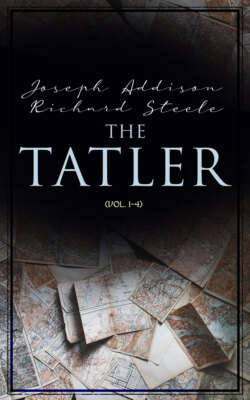Читать книгу The Tatler (Vol. 1-4) - Joseph Addison - Страница 7
На сайте Литреса книга снята с продажи.
To Mr. Maynwaring.52
ОглавлениеTable of Contents
SIR,
The state of conversation and business in this town having been long perplexed with pretenders in both kinds, in order to open men's eyes against such abuses, it appeared no unprofitable undertaking to publish a paper which should observe upon the manners of the pleasureable, as well as the busy part of mankind. To make this generally read, it seemed the most proper method to form it by way of a letter of intelligence, consisting of such parts as might gratify the curiosity of persons of all conditions, and of each sex. But a work of this nature requiring time to grow into the notice of the world, it happened very luckily, that a little before I had resolved upon this design, a gentleman53 had written Predictions, and two or three other pieces in my name, which had rendered it famous through all parts of Europe; and by an inimitable spirit and humour, raised it to as high a pitch of reputation as it could possibly arrive at.
By this good fortune, the name of Isaac Bickerstaff gained an audience of all who had any taste of wit, and the addition of the ordinary occurrences of common journals of news brought in a multitude of other readers. I could not, I confess, long keep up the opinion of the town, that these lucubrations were written by the same hand with the first works which were published under my name; but before I lost the participation of that author's fame, I had already found the advantage of his authority, to which I owe the sudden acceptance which my labours met with in the world.
The general purpose of this paper, is to expose the false arts of life, to pull off the disguises of cunning, vanity, and affectation, and recommend a general simplicity in our dress, our discourse, and our behaviour. No man has a better judgment for the discovery, or a nobler spirit for the contempt of such impostures, than your self; which qualities render you the most proper patron for the author of these essays. In the general, the design, however executed, has met with so great success, that there is hardly a name now eminent among us for power, wit, beauty, valour, or wisdom, which is not subscribed, for the encouragement of the two volumes in octavo, on a royal or medium paper.54 This is indeed an honour, for which it is impossible to express a suitable gratitude; and there is nothing could be an addition to the pleasure I take in it, but the reflection that it gives me the most conspicuous occasion I can ever have, of subscribing myself,
Sir,
Your most obliged, most obedient, and most humble Servant,
ISAAC BICKERSTAFF.
52. Arthur Maynwaring was descended from the ancient family of the Maynwarings of Over Peover, Cheshire. He was born in 1668, at Ightfield, Shropshire, and was educated at the Shrewsbury Grammar School and at Christ Church, Oxford, where Smalridge was his tutor. Filled with prejudices against the Revolution, he came to London to study law, but a political satire which he published brought him under Dryden's notice, and the kind reception given him by several Whig statesmen, to whom he was introduced, caused him to change his views on politics, and after his father's death in 1693 he gave up the law and determined to push his fortunes at the Court. He was made a Commissioner of Customs and afterwards Auditor of the Imprests. He was admitted to the Kit-Cat Club, and in 1706 the interest of Godolphin procured him a seat in the House of Commons. Upon the fall of the Whig ministry in 1710, Maynwaring set up the Medley, a weekly paper in which the attacks of the Examiner were answered, and wrote various political pamphlets. But his health soon broke down, and he died in November, 1712. Mrs. Oldfield, the actress, was the sole executrix of his will, by which he divided his small property of some £3000 between her, a son that he had by her, and his sister. There appear to have been many good points in his character. His "Life and Posthumous Works" were published by Oldmixon in 1715. "Maynwaring, whom we hear nothing of now, was the ruling man in all conversations, indeed what he wrote had very little merit in it" (Pope, in Spence's "Anecdotes," 1820, p. 338). Steele says that Harley told him that he had to thank Maynwaring for his post of Gazetteer.
53. Swift.
54. "Encouragement of these volumes," in the octavo edition. The list of subscribers to the original octavo edition comprised the names of some four hundred of the most prominent persons of the day.
